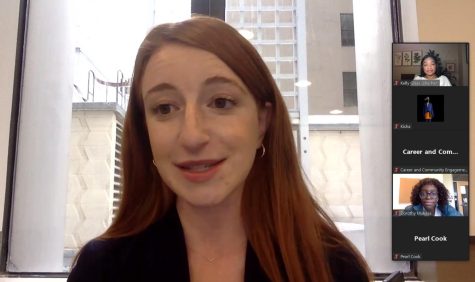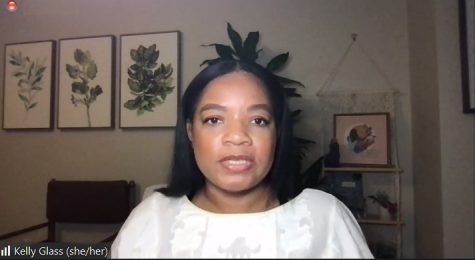Whitman alum and NYT journalist Gillian Friedman and Parents magazine editor Kelly Glass discuss the “beautiful and perfect endeavour” of journalism
October 28, 2021
On Oct. 21, Whitman alum Gillian Friedman, a business reporter for the New York Times, and Kelly Glass, the executive editor of Black Parenting for Parents Magazine, spoke to Whitman students on Zoom about their careers. Hosted by Assistant Professor of English Kisha Schlegel, the two esteemed journalists discussed the tumultuous nature of their work, and its pay, to the unmatched passion of a journalist.
Before landing a fellowship with the New York Times, Friedman worked for a number of small publications, collaborating with people who held different religious and political perspectives than her own. Something she loves about journalism is the constant contention between opinions.

“It’s a beautiful and perfect endeavor, to try to represent all these different truths, knowing you’ll always fail in some way,” Friedman said. “Where else do we really find ourselves able to talk to people with widely different views than our own?”
Objectivity is deeply ingrained into the public’s perception of journalism. In recent years, prominent publications have faced scrutiny over political biases in articles.
Objectivity is an important but impossible ideal—something that journalists always work towards, but never fully achieve.
“To me, it’s actually harmful, specifically as a journalist of color, and journalists from other marginalized groups,” Glass said. “At the root of it, it’s this idea that white heterosexual…perspective is neutral. Everything else outside of that was outside of objectivity.”
Glass recognized that everyone has a bias, and journalists should mitigate the interference of personal beliefs in their methodical approach: the ways writers find sources and report stories.
Considering different perspectives and arriving at one’s own opinion requires extra effort. In its ideal form, that’s the role of the media—to educate citizens so they can formulate their own opinion. Democratic societies rely on the free press, where journalism can flourish.
“I believe in it so much,” Friedman said. “Great journalism can change the world and I want to be one of those journalists who does. You really have to have that fire in your belly because it’s the kind of thing that won’t come easy…You have to be willing to fight for it.”
As much as the two women love their careers, they admitted to the financial struggles that come with the industry.
“My first freelance clip paid like pennies,” Glass said. “I knew that in order to get to the Washington Post, the New York Times bylines, I had to start somewhere.”

Even now that Friedman is working for the New York Times she still worries about her financial future.
“Now that I’m seeing 30, I’m worried about it…Are you okay having a job that might never break six figures? Do you know what that means in terms of your ability to live in a big city?” Friedman said. “You have to think about it.”
Both Glass and Friedman emphasized the importance of persistence in their field. Wako Soma, a junior in Professor Schlegel’s introduction to creative writing class who attended the virtual panel, said this sentiment of persistence especially stuck out to her.
Soma remembered Friedman’s reluctance to email her professors, but now as a reporter “she is sending out five or more emails to get what she wants,” Soma said.
Before working for the New York Times, Friedman recalled her relentless networking. She would send email after email to successful journalists, including some from the NYT. A lot of the time she was ignored, but occasionally she would hear back.
Networking for Glass looked different. She joined journalist communities where members would help each other out, offering skills and connections to help peers. Glass came into these spaces looking to give, not necessarily to gain.
“When the time came, people looked out for me,” Glass said. “Persistence is absolutely spot on. The journalist who is persistent is the one who is going to come out on top.”
A recording of the Student to Journalist Panel is available online.



